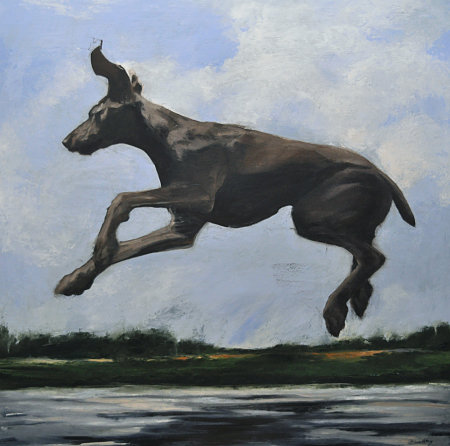
The Pinecone
She was intrigued to find Greek women with pinecones on poles, in what she recognized from the one Classics course she’d taken under protest in college as paintings of Dionysian revels, with the god and his attendants. The cone-topped staff the revelers carried, wreathed with ivy and vine-leaves, was a thyrsus.
She read about the maenads, the so-called raving ones (she so identified!), the Hellenic women maddened by Dionysus into a state of ecstatic frenzy through a combination of dancing and drinking. In their intoxicated state, they’d lose all self-control, shout out in wild delirium, engage in uncontrolled sexual acts, and ritualistically hunt down and tear to pieces animals—and sometimes even men and children—devouring the raw flesh. That sounded only reasonable, Mandy thought, maddened as she’d become.
She fell asleep and slept soundly at last, dreaming indistinctly about pinecones stuck up on maenads’ poles.
*
Over the weekend she drove to campus, carefully avoiding the pinecone lurking at the end of the drive, and walked from the parking lot behind Mem Aud to Green Library to check out The Bacchae, the Euripides play about the ecstatic women followers of Dionysus. She read it from start to finish sitting at a wooden picnic table underneath the campus oaks. She later e-mailed her sister Gretchen, in Crete, to see if she knew anything else about the maenads or pinecones in ancient Greek culture.
*
During the next week her dreams became more compelling than her waking life. In them, the mynaeds dressed in fawn skins lured her into their nightly revels. She was led into the dark, oak-blanketed hills above Foothill by Ito, Agave, and Harmonia, where Cadmus and a dressed-up Pentheus joined them—inviting her to drink margaritas with them from big dripping glasses, to join in dancing Zumba wildly in deserted parking lots (Tesla, SAP and EPRI, DBIX, VMware) until the bird chorus signaled dawn.
Fawn skins were found for her to wear. Agave wove an ivy-wreath around her head, smoothing her hair back under it as a mother would have, and Harmonia persuaded her to let snakes writhe around her bare arms. Somewhat self-consciously at first, she carried the thyrsus trailing its vine leaves and tipped by the triumphant pinecone. Soon, though, she realized that it was a natural and proud extension of her own transubstantiated being.
